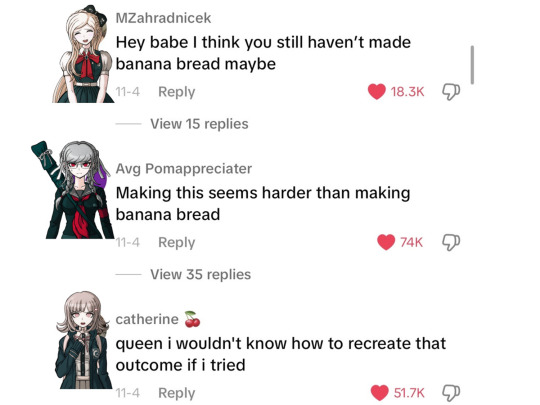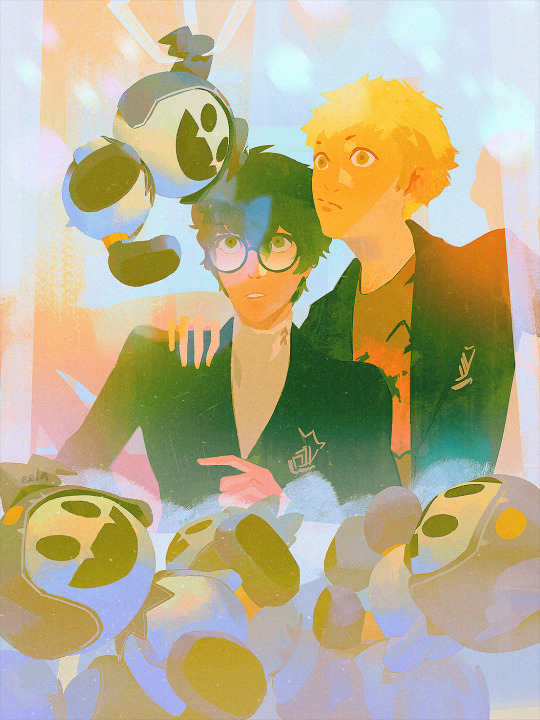yo hajime check it out i’m already eatin
Last active 3 hours ago
Don't wanna be here? Send us removal request.
Text

have you ever considered starting fires for fun?
2K notes
·
View notes
Text
Matching your freak is beautiful and all but what you really need is a boy who's infatuated with your freak. Down bad for your freak. Deeply intrigued by your freak. Eager to see more of your freak. Supportive of your freak. Gets bricked up witnessing your freak, even.
57K notes
·
View notes
Text
There's something small I want to share with you guys.
Like many posts of mine, it has to do with Komaeda. I love all of DR and all the characters, but it seems Komaeda comes up the most often when discussing translation. I wonder why that is?

Anyways, it's about this line. While not a mistranslation per se, there's a lot of nuance in the original line. I don't know if the differences are large enough to matter to most people, but being obsessed with little details is basically my whole thing, haha.

それはちょっと傷付くな...日向クンには親近感を抱いていたからさ。
We will be talking about the highlighted parts. I find it a quite interesting case of careful word choice and script usage.
それはちょっと傷付くな can indeed be translated as "That stings", but...I feel it's more complicated, personally.
Normally, when writing about getting your feeling hurt, it's written as 傷つく. The second part is written in Hiragana. This word literally means "to be afflicted with a wound", and can be used literally, but also metaphorically to just mean "it hurt my feelings."
While the literal sense can also be written in Hiragana, the Kanji usage of 傷付く more often carried the nuance of being physically injured (both are pronounced the same).
So, I find it interesting Komaeda says 傷付く and not 傷つく. He is not physically injured, but he is using the Kanji form. Since this is a written work of fiction, I tend to take script choices like this as deliberate intentions to convey a special feeling. In this case, it would imply Komaeda is emphasizing his pain - implying his hurt feels like a literal, actual wound.
But...it's kind of funny, because the word before that is ちょっと, which means "a little".
それはちょっと傷付くな means, literally, "That cuts a little", hence "that stings"...just a little cut.
But pairing "a little" with such an emphatic word creates this contradictory tone - to me at least.
Something like, "That kind of cuts me deeply."
Now, the thing is, scripts are obviously not seeable. They only exist in written language. So, from the in-universe perspective of the characters, all they heard was Komaeda say ちょっときずつく. I can imagine, then, all the people there obviously heard it as ちょっと傷つく. Komaeda's talking about his feelings after all, and he's even downplaying it. 傷つく only makes sense.
But us - the audience, who does not exist in the room with these characters - can see what Komaeda is really saying. It's like looking into his thoughts, almost - a privilege that only we, the reader, get. I think that's so cool.
Now...it is up for debate if that part is intentional. If we did write the line as "That kind of cuts me deeply," we would be getting rid of the fourth-wall aspect and instead interpreting the usage of Kanji as an actual, spoken thing...which it might actually be, as this is fiction. That's what can be so tricky about translating. Maybe Komaeda is just saying "that stings" out loud, but he's actually hurting a lot more inside - or maybe he's being contradictory and downplaying his spoken true feelings, saying "That really hurts me a little". We wouldn't know without direct confirmation from the writers.
Let me move on to the second part.
日向クンには親近感を抱いていたからさ。Does mean "I felt you and I were quite similar" ...sort of.
親近感 is a tricky word. The Kanji literally translates as "basically feel as if [we're] family", and is used to describe a sense of closeness and familiarity, of affection or affinity.
It absolutely can be used to say you feel you and someone are quite similar...but in my opinion, that would be 親近感を持つ. See the verb change? That's because you can use multiple verbs with 親近感 that all mean "to have" in some way.
What makes 抱いていた an interesting choice is that this is the most positive form the phrase can take (to my ears, at least). 抱 is the Kanji to hug or embrace, and is often used as such, while 持, by contrast, simply means to posses or to own. Both describe the act of "holding" something, but one is much more emotional and warm.
By saying 親近感を抱いていた, Komaeda is attaching this warm, positive feeling to the word.
I personally would write it as "feeling close".
And don't forget the さ particle at the end, which adds emotional emphasis.
So in all, I would write this as:
"That sort of cuts me deeply...I felt rather close to you, Hinata-kun."
Neat!
70 notes
·
View notes
Text

based on that one bit of thieves den dialogue
2K notes
·
View notes
Text
it's called the Switch 2 because you Switch 2 a cheaper hobby
39K notes
·
View notes
Text
Ok I got some boba and sat outside and you know what. I still feel like shit
probably won’t be an update this weekend bc I’m too depressed to look at the chapter I’m supposed to post 🗿
4 notes
·
View notes
Text
probably won’t be an update this weekend bc I’m too depressed to look at the chapter I’m supposed to post 🗿
4 notes
·
View notes
Text








April fools day stuff I made for when I was Hajime on Twitter
569 notes
·
View notes
Text









I'm now selling SDR2 ship pins on my etsy plus a 25% off sale for til April 4th. Yay!
🚫 NOT APRIL FOOLS
53 notes
·
View notes
Text

happy april fools
303 notes
·
View notes
Text







#I’m fucjing crying#I love the idea of Nagito fucking up and the whole group roasting him#danganronpa
664 notes
·
View notes





